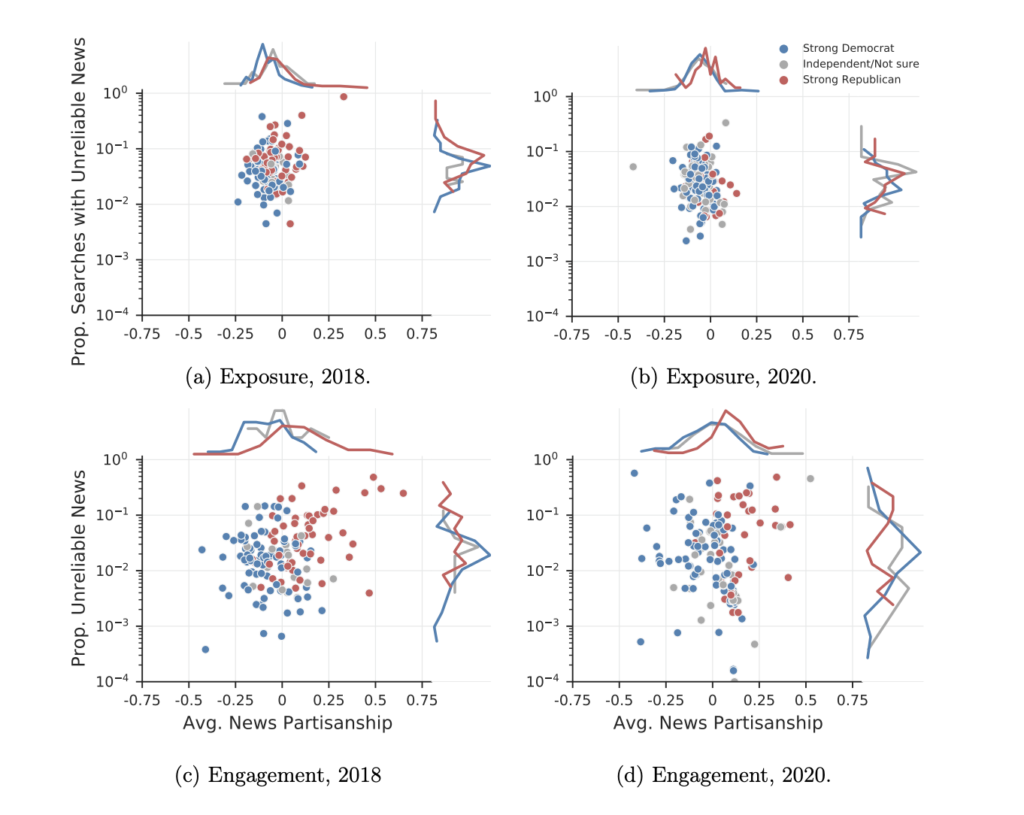'Strong' Republicans Asymmetrically Select Into Echo Chambers When Searching Google, Researchers Conclude
Justin Hendrix / Jan 11, 2022A topic of ongoing concern for policymakers and the public is the ways in which people are exposed to and select news and political information on digital platforms. While a great deal of research in this area of late has focused on social media, researchers from Stanford, Northeastern and Rutgers recently released the preprint results of a study that looks at Google Search.
The study combined survey data with observational data collected from participants in two waves during the 2018 and 2020 US election cycles. The researchers were able to capture both exposure (what search results people saw) and engagement (what search results people clicked) using a browser extension installed by the participants. The methodology required collecting a number of other variables:
- A survey aided the “partisan identification” of the participants, which was measured along a 7-point scale from “strong Democrat” to “strong Republican.”
- The browser extension collected “snapshots” of Google Search results the participants saw and extracted URLs from their search history, then matched those URLs against their browser history.
- The “reliability” of the news sites was based on assessments from prior peer-reviewed research and from NewsGuard, a company that rates news domains against journalistic criteria.
- The “partisanship” of news sites was derived from “the differential sharing patterns of Democrats and Republicans in a large virtual panel of Twitter users.” For instance, links from DailyKos are shared almost entirely by individuals identifying as Democrats, whereas links from Conservative Review are shared almost entirely by those identifying as Republicans.
The study yielded several findings, including “a weak filter bubble effect in the news our participants saw in their Google Search results, and a substantially stronger echo chamber effect in the domains our participants engaged with while browsing the web." That phenomenon is more apparent on the right than the left-- "strong Republicans are asymmetrically selecting into 'echo chambers.'”
Perhaps heartening, when it comes to search “unreliable news exposure and engagement was generally rare and concentrated among a small number of participants,” accounting for only 2.1% of exposure and 3.6% of engagement in 2018 and 0.77% of exposure and 2.1% of engagement in 2020. In both waves of the study, the majority of the exposure to unreliable news was concentrated among less than a quarter of the participants. According to the researchers, "these findings suggest that Google Search’s contribution to engagement with unreliable news is small relative to the contribution of other factors, like users’ direct navigation to their preferred news sources, or referrals from other websites or platforms."

participants were exposed to (grouped by 7-point PID) via Google Search results (a, b) and
engaged with via Google History (c) and Tab Activity (d). (Source)
When it comes to engagement with unreliable news, partisanship plays a role in the result- a finding that is consistent with several other studies. “Strong Republicans engage with significantly more news from unreliable sources than Strong Democrats” across both the survey waves, but strong partisans on the left and the right “engage with substantially more partisan and unreliable news than they were exposed to in their Google Search Results.”
Nodding to work on social media platforms that produced similar results, the researchers suggest more work should be done to “understand the mechanisms driving these concentrated behaviors by taking a broader view of the information systems involved, both on- and offline.” So for instance, what role does television or radio consumption play, or the influence of particular communities?
The researchers note that the findings “do not necessarily imply that Google’s Search algorithms [are] normatively unproblematic,” but that coming to conclusions about the role of search is complicated– a situation that isn’t helped by the lack of access to platform data. The sample sizes for the waves-- numbering in the hundreds of participants-- are exceedingly small compared to the scale of Google’s user base. But, this type of methodology does point to what might be possible if researcher access to data-- Google's, and that of other platforms-- is eventually mandated by law.
Engagement Outweighs Exposure to Partisan and Unreliable News within Google Search: Ronald E. Robertson, Jon Green, D. Ruck, Katya Ognyanova, Christo Wilson, D. Lazer, 31 December 2021
Authors
